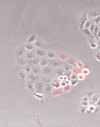Prostate cancer stem cells
- PMID: 19040209
- PMCID: PMC2673349
- DOI: 10.1002/path.2478
Prostate cancer stem cells
Abstract
Despite the discovery over 60 years ago by Huggins and Hodges that prostate cancers respond to androgen deprivation therapy, hormone-refractory prostate cancer remains a major clinical challenge. There is now mounting evidence that solid tumours originate from undifferentiated stem cell-like cells coexisting within a heterogeneous tumour mass that drive tumour formation, maintain tumour homeostasis and initiate metastases. This review focuses upon current evidence for prostate cancer stem cells, addressing the identification and properties of both normal and transformed prostate stem cells.
Figures


References
-
- Huggins C, Stevens RE, Jr, Hodges CV. Studies on prostate cancer: the effects of castration on advanced carcinoma of the prostate gland. Arch Surg. 1941;43:209–223.
-
- Taplin ME, Rajeshkimar B, Halabi S, Werner CP, Woda BA, Picus J, et al. Androgen receptor mutations in androgen-independent prostate cancer. Cancer and Leukemia group B study, 9663. J Clin Oncol. 2003;21:2673–2678. - PubMed
-
- Chen CD, Welsbie DS, Tran C, Baek SH, Chen R, Vessella R, et al. Molecular determinants of resistance to anti androgen therapy. Nat Med. 2004;10:33–39. - PubMed
Publication types
MeSH terms
Grants and funding
LinkOut - more resources
Full Text Sources
Other Literature Sources
Medical

